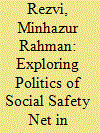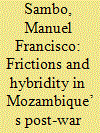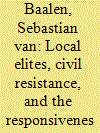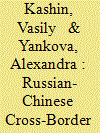|
|
|
Sort Order |
|
|
|
Items / Page
|
|
|
|
|
|
|
| Srl | Item |
| 1 |
ID:
182457


|
|
|
|
|
| Summary/Abstract |
The purpose of the study is to explore the politics of beneficiaries’ selection and resource distribution of social safety net (SSN) programs and how local elites and political groups establish political settlement by using it as a tool. In developing countries, formal systems are not strong enough and elites’ groups use their power to create informal institutions for securing their interests. As other studies have shown, informal politics influence the processes of selection and distribution of SSN programs in Bangladesh. The study is qualitative in nature and the selected research area is Rajakhali Union in Cox’s Bazar District. The study found that informal systems (e.g. clientelist politics, political affiliation, personal conflicts, and kinship) determine the selection and distribution of SSN programs. The Union Parishad (UP) members distribute the SSN programs to their ineligible clients (supporters, local elites, and political groups) by bypassing the formal systems for strengthening clientelist relations, increasing their legitimacy, stabling their power, and increasing their vote banks. They (UP members, political elites, and local elites) have allowed introducing more informal structures that better serve their interests. They have used the SSN programs as a tool for establishing the political settlement (distribution of power between UP members and local elites).
|
|
|
|
|
|
|
|
|
|
|
|
|
|
|
|
| 2 |
ID:
190932


|
|
|
|
|
| Summary/Abstract |
It has been about three decades since Mozambique transitioned from a brutal civil war and one-party rule to peace and democracy. Although Mozambique has not relapsed into another large-scale civil war, sustainable peace and democracy in the country have become ever more elusive. In 2013, military clashes between Renamo and the Frelimo-led government resumed and prompted a new peace process, whilst poverty and inequalities are rampant, authoritarianism is on the rise, and an Islamic insurgency erupted in the northern region. Accordingly, while some scholars still praise Mozambique’s post-war peacebuilding as successful, others have claimed that peacebuilding failed. This article evades the binary of successful or failed liberal peacebuilding in Mozambique. Instead, it applies the concepts of friction and hybridity to offer an alternative way of reading the 30 years of peace (building) in Mozambique. The article argues that frictions in values and interests between the international/liberal peacebuilders and local (non-liberal) elites have resulted in a negative and unstable hybrid peace, that is, a precarious peace in Mozambique.
|
|
|
|
|
|
|
|
|
|
|
|
|
|
|
|
| 3 |
ID:
182663


|
|
|
|
|
| Summary/Abstract |
Why is rebel governance more responsive in some areas than in others? In recent years, scholars have started to examine the determinants of rebel governance. Less attention has been given to explaining variation in the responsiveness of rebel governance, that is, the degree to which rebels are soliciting and acting upon civilian preferences in their governance. This article seeks to address this gap by studying local variation in rebel responsiveness. I argue that rebel responsiveness is a function of whether local elites control clientelist networks that allow them to mobilize local citizens. Strong clientelist networks are characterized by local elite control over resources and embeddedness in local authority structures. In turn, such networks shape local elites’ capacity for mobilizing support for, or civil resistance against, the rebels, and hence their bargaining power in negotiations over rebel governance. Drawing on unique interview and archival data collected during eight months of fieldwork, as well as existing survey data, the study tests the argument through a systematic comparison of four areas held by the Forces Nouvelles in Côte d’Ivoire. The analysis indicates that the strength of local elites’ clientelist networks shapes rebel responsiveness. Moreover, it provides support for the theorized civil resistance mechanism, and shows that this mechanism is further enhanced by ethnopolitical ties between civilians and rebels. These findings speak to the burgeoning literature on rebel governance and to research on civil resistance. In addition, the results inform policy debates on how to protect civilians in civil war.
|
|
|
|
|
|
|
|
|
|
|
|
|
|
|
|
| 4 |
ID:
189306


|
|
|
|
|
| Summary/Abstract |
Cross-border cooperation between Russia and China is not only an important part of bilateral cooperation but also a stimulus for the accelerated development of frontier territories. Studies of its results over the past 30 years allow us to trace institutional changes in both countries, as well as general trends in their foreign trade and investment activity. The current state of Russian-Chinese cross-border cooperation is mainly characterized by gradually waning interest on both sides, which belies the growing number of state programs, framework agreements, and initiatives with major political support. China is increasingly cautious about transit benefits and prospects of industrial cooperation at the local level due to the small market capacity of the Russian Far East and its underdeveloped infrastructure. Both countries are displaying distrust, bilateral projects are becoming increasingly uncoordinated, their implementation is delayed, and the results are contrary to expectations. To understand the reasons for this imbalance, the authors consistently analyze the main dimensions and indicators of Russia-China cross-border cooperation, the specifics of the current legal and institutional framework, as well as the results of a number of state programs and major bilateral projects.
|
|
|
|
|
|
|
|
|
|
|
|
|
|
|
|
|
|
|
|
|